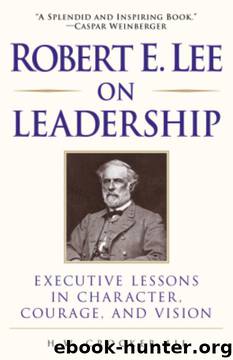Robert E. Lee on Leadership by H.W. Crocker III

Author:H.W. Crocker III
Language: eng
Format: epub
Published: 2019-01-03T16:00:00+00:00
Self-Discipline
To lead, Lee well understood, one first had to be the master of oneself. Original Sin taught him to expect human failure. But a Christian and a gentleman was obligated to do better. Lee believed that the more one surmounted the baser passions of human nature, the more one approached the divine, the more one successfully imitated Christ, the more one fulfilled one’s duty as a Christian gentleman. It was a hierarchical understanding that fit his background and upbringing and that he saw expressed and experienced in the reality of nature, social classes, the army, and the church.
Self-discipline is a basic requirement of effective leadership. That much is a commonplace. If one intends to lead by example and inspire respect, one has to fulfill the ideal of someone whose vision and performance are coherent, organized, and effective. As Lee said, “I cannot consent to place in the control of others one who cannot control himself.”
But the only known way to achieve self-mastery goes against the current of modern American society. That single way, the narrow gate through which effective leaders must pass, was expressed by Lee after the war when he advised a mother on the instruction of her infant son: “Teach him he must deny himself.”
In our own age, we might expect an educator to say: “Teach him self-expression” or “Teach him self-esteem.” And, at first blush, teaching a business leader to deny himself might seem at odds with the very nature of capitalism, which seeks to fulfill and inflame material wants.
But business, like war, can be a perilous undertaking, with livelihoods—if not lives themselves—at stake. In business as in war success is often given to the best disciplined, the toughest, and the most prepared.
A successful business leader must be self-disciplined. He needs to put hard work before leisure; to put the desires of his customers for a high-quality, low-priced product ahead of his own desire for a cheaply produced, high-priced product. He needs to lead by a personal example that inspires employees rather than by a personal convenience that makes them cynical and ready to trim corners or cut and run to another employer. He needs to understand, as a plaque on Ronald Reagan’s desk in the Oval Office read, that “There is no limit to what a man can do or where he can go if he doesn’t mind who gets the credit.”
That sentiment was well-ingrained in Lee. The leadership challenge he faced in the War Between the States was exacerbated not only by the circumstances of attempting to create a new army practically overnight—and in the face of imminent invasion by a much larger, much richer, much more industrialized foe—but because the Southern society for which Lee fought was full of hot-headed, hot-blooded individualists, especially in the officer corps, which was dominated by status-seeking West Point-educated officers, former governors, wealthy planters, academics, lawyers, self-made businessmen, and the occasional fighting bishop. They were men used to command. The Confederate troops were largely independent-minded small-time farmers used to governing themselves.
Download
This site does not store any files on its server. We only index and link to content provided by other sites. Please contact the content providers to delete copyright contents if any and email us, we'll remove relevant links or contents immediately.
| American Revolution | Civil War |
| US Presidents |
Fanny Burney by Claire Harman(26603)
Empire of the Sikhs by Patwant Singh(23086)
Out of India by Michael Foss(16853)
Leonardo da Vinci by Walter Isaacson(13336)
Small Great Things by Jodi Picoult(7143)
The Six Wives Of Henry VIII (WOMEN IN HISTORY) by Fraser Antonia(5515)
The Wind in My Hair by Masih Alinejad(5095)
A Higher Loyalty: Truth, Lies, and Leadership by James Comey(4964)
The Crown by Robert Lacey(4817)
The Lonely City by Olivia Laing(4802)
Millionaire: The Philanderer, Gambler, and Duelist Who Invented Modern Finance by Janet Gleeson(4478)
The Iron Duke by The Iron Duke(4356)
Papillon (English) by Henri Charrière(4274)
Sticky Fingers by Joe Hagan(4199)
Joan of Arc by Mary Gordon(4110)
Alive: The Story of the Andes Survivors by Piers Paul Read(4033)
Stalin by Stephen Kotkin(3966)
Aleister Crowley: The Biography by Tobias Churton(3640)
Ants Among Elephants by Sujatha Gidla(3467)
